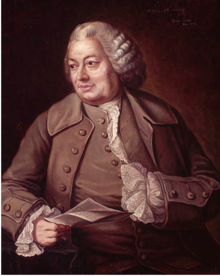Thomas Pichon
| Thomas Pichon | |
|---|---|

Thomas Pichon by Henri Baud(1800–1900) (copied from original portrait by N. Coucourt)
|
|
| Born |
March 30, 1700 Vire (dept of Calvados), France |
| Died | November 22, 1781 (aged 81) Saint Helier, Jersey |
| Nationality | French |
| Known for | colonial official, spy, and author |
Thomas Pichon (1700–1781) was a French government agent during Father Le Loutre's War who is renowned for betraying the French, Acadian and Mi’kmaq forces by providing information to the British, which led to the fall of Beausejour. He has been referred to as "The Judas of Acadia." Upon his return to France, he had a relationship with French author Jeanne-Marie Leprince de Beaumont (1757–1760), writer of Beauty and the Beast.
During Father Le Loutre's War, Pichon entered the service of secretary for Jean-Louis de Raymond, latterly reputed to be a place-seeker, who had been appointed Governor at the Fortress of Louisbourg and Île-Royale (New France) in 1751.
Jacques Prevost de la Croix dispatched Pichon to Chignecto, employing him as scrivener and subdelegate of the intendant of New France. Pichon arrived at Beauséjour on 3 Nov. 1753. For the next two years he acted as chief clerk responsible for stores. Pichon served as scribe to the commandants. Pichon also helped Father Jean-Louis Le Loutre with his writing, although Pichon's suspicions about Roman Catholicism were confirmed by the missionary and he came to despise the priest.
British commander Captain George Scott invited Pichon to Fort Lawrence to offer him monetary gain for information on the French forces. For more than a year Pichon practised espionage and subterfuge against the French under the assumed name of Tyrell. He sent Scott and his successor, Captain John Hussey, detailed accounts of French activities in Quebec and Acadia, plans of forts Beauséjour and Gaspereau (near Port Elgin, N.B.), comments on the defences of Louisbourg, copies of official documents, censuses of Acadian refugees, reports on French missionaries and warnings of attacks by the Mi'kmaq and Acadians.
...
Wikipedia
